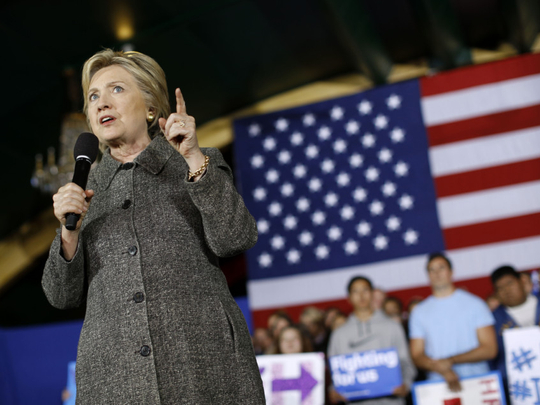
It has been more than a year since the infamous news conference at the United Nations, at which Hillary Clinton falsely asserted, “I did not email any classified material to anyone on my email. There is no classified material”. For a year the Hillary campaign has raised a number of specious excuses: “It was allowed”; other secretaries did the same (not true); the emails were only retroactively classified (not true); there was no risk classified information might have been compromised (unfounded); and her offences were not serious (highly questionable).
If it was not previously, even the most loyal Hillary supporters should by now recognise the seriousness of her problems. The FBI does not assign 147 people to investigate something trivial, “allowed” or lacking national security implications.
If it was obvious is no case against Hillary existed, the FBI would not have methodically gathered information and waited until the end or nearly the end of the investigation to interview the main culprit. That’s exactly what occurred here, according to the Los Angeles Times: “The interviews by FBI agents and prosecutors will play a significant role in helping them better understand whether Hillary or her aides knowingly or negligently discussed classified government secrets over a non-secure email system when she served as secretary of State.
“The meetings also are an indication that much of the investigators’ background work — recovering deleted emails, understanding how the server operated and determining whether it was breached — is nearing completion.
“The interviews are critical to understand the volume of information they have accumulated,” said James McJunkin, former head of the FBI’s Washington field office. “They are likely nearing the end of the investigation and the agents need to interview these people to put the information in context. They will then spend time aligning these statements with other information, emails, classified documents, etc., to determine whether there is a prosecutable case.”
If the FBI had determined, like so many Hillary defenders, that there was no THERE, its agents would not bother interviewing the former secretary of state and now Democratic presidential front-runner.
If there was no pattern of deliberate evasion of classification rules, Hillary would not now be potentially facing legal jeopardy. But, as the Washington Post reported, Hillary was determined to avoid administration directives even about her BlackBerry. (“From the earliest days, Hillary aides and senior officials focused intently on accommodating the secretary’s desire to use her private email account, documents and interviews show.”) Her contempt for the rules that the lowliest government employee must abide by suggests a shocking indifference to the law and the rationale behind security measures. (“Throughout, they paid insufficient attention to laws and regulations governing the handling of classified material and the preservation of government records, interviews and documents show. They also neglected repeated warnings about the security of the BlackBerry while Hillary and her closest aides took obvious security risks in using the basement server.”) If it was not her intent to compromise national security, it is certainly fair to say it was her intent to ignore restrictions associated with her BlackBerry and private server.
With the year-long investigation reaching its conclusion, Hillary’s fate — likely the outcome of the 2016 presidential race — rests in the hands of the FBI, the one agency arguably beyond the political influence of Hillary or the administration.
Should it criticise or point out lapses of judgement in her conduct without recommending prosecution, she will likely continue her march to the nomination. In a general election against Donald Trump, even Republicans may find that as egregious as her lapse in judgement may have been, the danger inherent in a Trump presidency is so great that the country would be better off in her hands than his.
Should the FBI find, however, that she either intentionally compromised classified material or was negligent in her handling of classified material, it will be compelled to refer the case for prosecution. At that point it may make no difference politically if the Justice Department proceeds or not (although career Justice Department officials would be wary about the perception of covering up or ignoring evidence of a crime). The finding by the FBI that there is the basis for prosecution in and of itself would make her candidacy problematic in the extreme. (Will President Barack Obama pardon her? What will happen if she were elected and then indicted?)
The potential for FBI action, incidentally, should influence her vice-president pick, if it comes before a final decision by the FBI. With the FBI’s action hanging over her head, the VP pick had better be someone who could plausibly win without her and/or govern in her absence; choosing an inexperienced lightweight for electoral concerns may no longer be an option. Better to look for a current or former senator or governor who could beat Trump, if need be. (California Governor Jerry Brown?)
As the potential for a Trump nomination increases, a great number of Republicans who will never vote for Trump (in large part because of his unsuitability to serve as commander-in-chief) may be faced with the unimaginable. Hillary has become the safety cord to pull, the least horrible of two horrible alternatives and at least a semi-responsible commander in chief, they reason, if Trump captures the GOP nomination. What if their backup plan, Hillary, gets knocked out by the FBI and there is no third candidate? (Rueful voters may be asking themselves, Just because Hillary messed up with her server, does the country deserve to get stuck with Trump?)
The potential for a Trump-Bernie Sanders or Trump-Hillary vice-president pick general election should panic both Democrats and Republicans. Perhaps Vice-President Joe Biden’s staff should start figuring out how to parachute into the Democratic National Convention. He may be the back-up to the back-up for despondent voters.
— Washington Post
Jennifer Rubin writes the Right Turn blog for the Washington Post, offering reported opinion from a conservative perspective.










